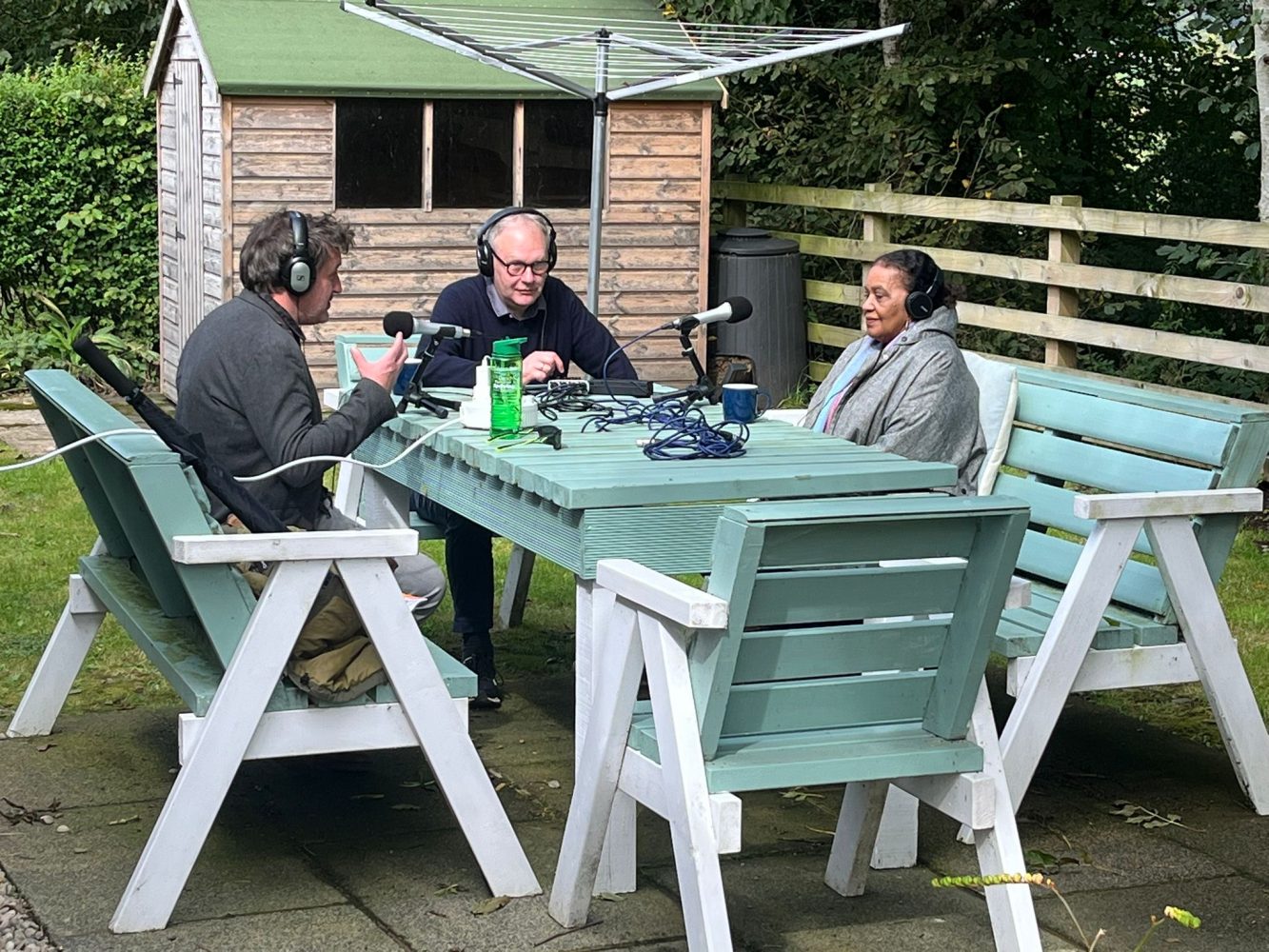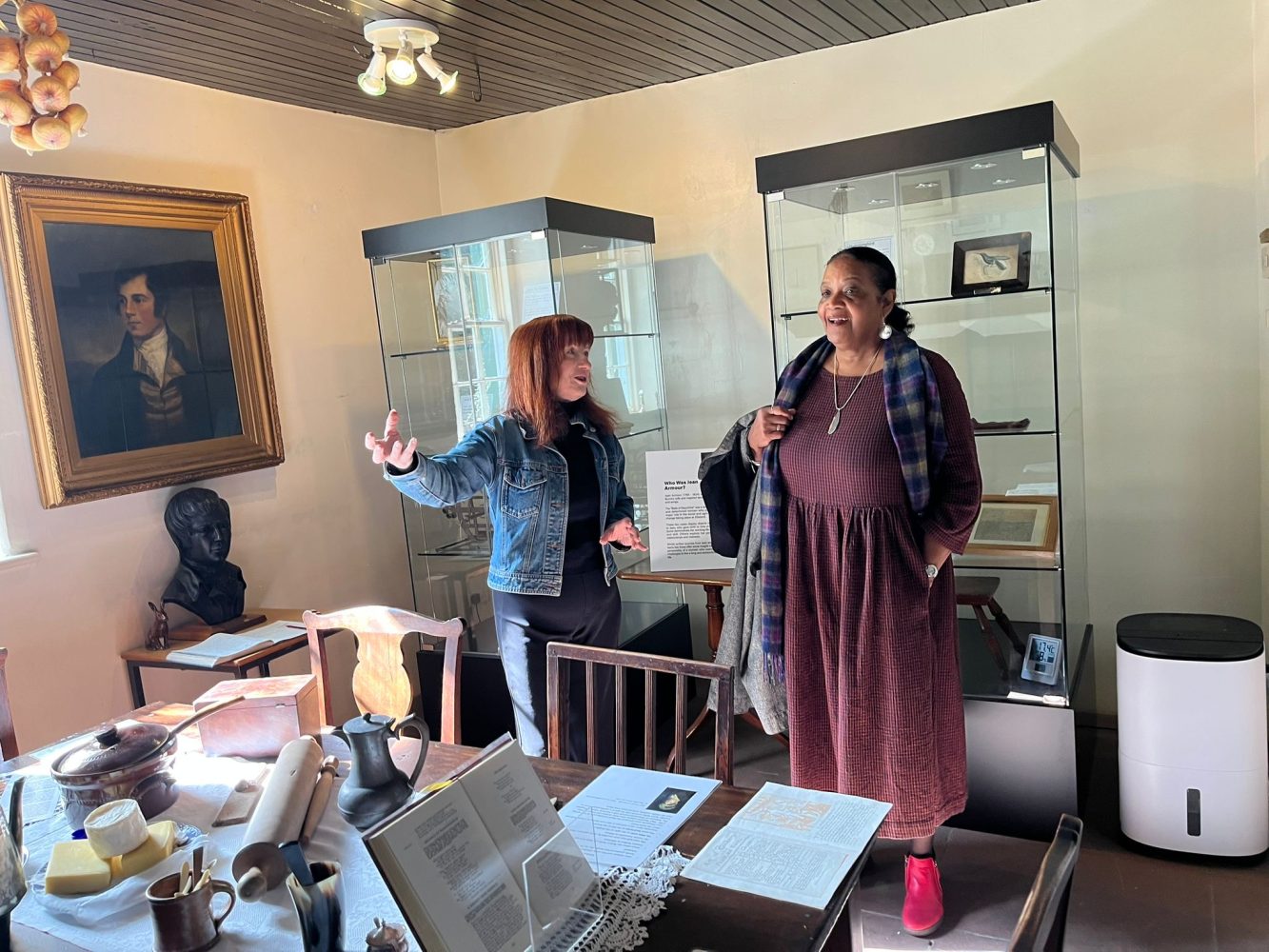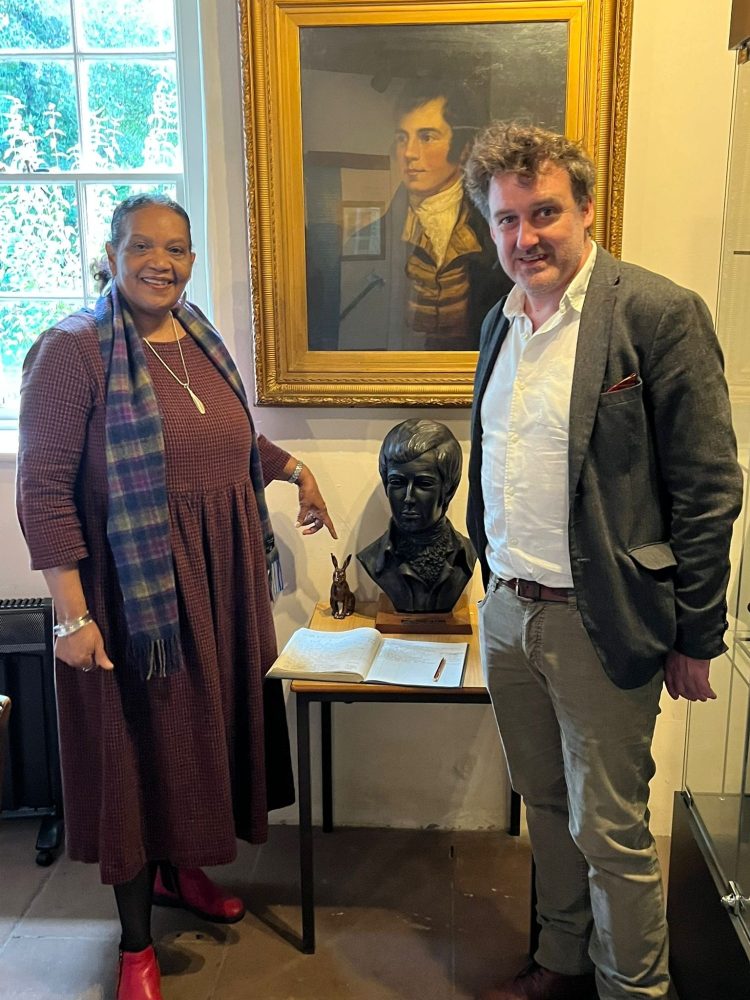The murmuring sound of the River Nith is a constant as it flows gently past Ellisland Farm. It was a sound that would have been very familiar to Robert Burns as he lived and worked here, and recently that same water provided the soundtrack for an engaging conversation between two national poets: Scotland’s Makar Peter Mackay and Jamaica’s former Poet Laureate Lorna Goodison.
Their meeting marked the culmination of the first-ever literary residency at Ellisland, and what emerged from their dialogue was a meditation on poetry itself as a form of healing, and a powerful reminder of why preserving this “sweet poetic ground” matters for future generations. The river appears throughout the conversation, a presence, occasionally rising in volume during moments of emotion, as if the landscape itself were participating in the dialogue.
“Words as charms, words as medicine”
Throughout their conversation, recorded for the Scottish Poetry Library’s podcast, both poets spoke of the idea of poetry as therapeutic, not metaphorically, but genuinely restorative. Lorna spoke movingly about how Burns’s lyrics had comforted her since childhood in Jamaica, where she learned his work as part of the colonial curriculum.
“I would often sing them to myself and sort of comfort myself by saying those words,” she reflected, remembering ‘Flow Gently, Sweet Afton’. “I think some of his poems do have that kind of effect. They soothe you, they help you. They make you sad, and then by making you sad, you feel better.”
This paradox, acknowledging that grief can bring comfort, resonated as Peter observed, Ellisland is “a place of great grief” as well as beauty. Burns was unhappy here toward the end of his tenure, struggling with farming and financial pressures, yet it was also where he created some of his most enduring work, where hardship and inspiration walked hand in hand along the riverbank.

The healing power of place
When asked about her first impressions of Ellisland, Lorna’s response was unequivocal: “It’s one of the most beautiful places I’ve ever been in… I can’t see any writer in the world not being just absolutely blissfully happy to be here.”
When Goodison read her poem “Rights,” an elegy exploring grief and attempted healing through Indigenous Canadian traditions, she noted that “there’s something about this place that makes me think about the ancestors and about people who have gone before, and about healing.”
Lorna stayed in Auld Acquaintance Cottage, right next to the historic site, and she found herself repeatedly drawn to themes of restoration and peace. “I feel a great measure of peace and healing right here,” she said.
Both poets explored the technical aspects of how poetry achieves its effects. Mackay discussed the Highland tradition of healing charms, where medical knowledge was passed down through precisely worded incantations, while Lorna connected this to Burns’s mastery of word choice and rhythm.
“His word choice is supreme,” she observed. “I often would read that and think, I wouldn’t have thought those words belong together. But when he puts them together, they do.”
Burns and Bob Marley: avatars of their people
One of the conversation’s most striking moments came when Lorna drew parallels between Burns and Bob Marley, two figures who died at thirty-seven, both nicknamed Robbie / Rabbie, both serving as containers for their people’s culture and intensely productive in their creativity. She said. “Any human being given all the things they had to cope with and deal with and could have produced that body of work puts us all to shame.”
Both figures, she suggested, offer a kind of communal healing through their work, Burns with ‘Auld Lang Syne’ which she described as “a charm that helps everybody… you feel somewhat hopeful, no matter how grim things are.”
For Mackay, responding to Burns as Scotland’s Makar required finding the right emotional register. His poem, commissioned by The Linen Hall’s Poetry Jukebox, was written in response to Burns’s love song for Jessie Lewars concludes with advice that could apply to Ellisland’s future itself: “Trust in the wrens, my love the rain and cherry blossom, not my blustering chest or jewelled words. Trust in them. Let them be.”

Legacy and renewal
Joan McAlpine, Project Director of the Robert Burns Ellisland Trust, emphasised how fitting it was to welcome these particular poets for the inaugural residency: “Lorna Goodison and Peter Mackay bring with them rich traditions in Jamaican Creole, English and Gaelic, and their residency shows how Burns’s legacy continues to spark creativity across languages and cultures.”
Ellisland stands at a crossroads. The cottage where Burns lived with his wife Jean and their young children faces the threats of damp, cold, and decay, yet this pilot residency, part of the “Saving the Home of Auld Lang Syne” project, offers a glimpse of what Ellisland could become: a vibrant creative destination where writers from across the world gather. When people around the world join hands to sing those immortal words each New Year, most don’t know that the place where Burns penned them faces an uncertain future. The restoration project aims to ensure that this site of international significance survives as a testament to Burns’s enduring legacy, and as a working space where his tradition of healing through words continues.
A centre for song, a place for contemplation
The Saving the Home of Auld Lang Syne project is about protecting the spaces where Burns walked and worked, ensuring these treasures are secured for future generations, while creating new income streams to sustain the site. Our vision is ambitious,: to restore the 1788 cottage, create a Centre for Song in the barns and byres, recreate Burns’s “hermitage” bothy, and develop a lively programme that honours the site’s creative legacy. But as Lorna and Peter’s residency demonstrates, it’s also about keeping alive a tradition of poetry as healing, of landscape as inspiration, of words as medicine

As the podcast recording ends as it started, with the sound of the Nith gently murmuring, one senses that Ellisland will continue to offer this particular medicine, a place where landscape, language, and legacy combine to create something healing. Where words, as Lorna put it, can function as “charms to bring calm and healing.”
The residency may have been the first, but with support for the Save the Home of Auld Lang Syne campaign, it won’t be the last time poets find restoration by these sweet waters. By contributing to this preservation effort, whether through spreading the word, volunteering time, or providing financial support, we become part of a community dedicated to preserving not just a building, but the living spirit of Burns’s creative legacy.
Read more about the Save the Home of Auld Lang Syne project and become a member of the Robert Burns Ellisland Trust.
To listen to Lorna Goodison and Peter Mackay’s conversation, head to the Scottish Poetry Library’s podcast.

